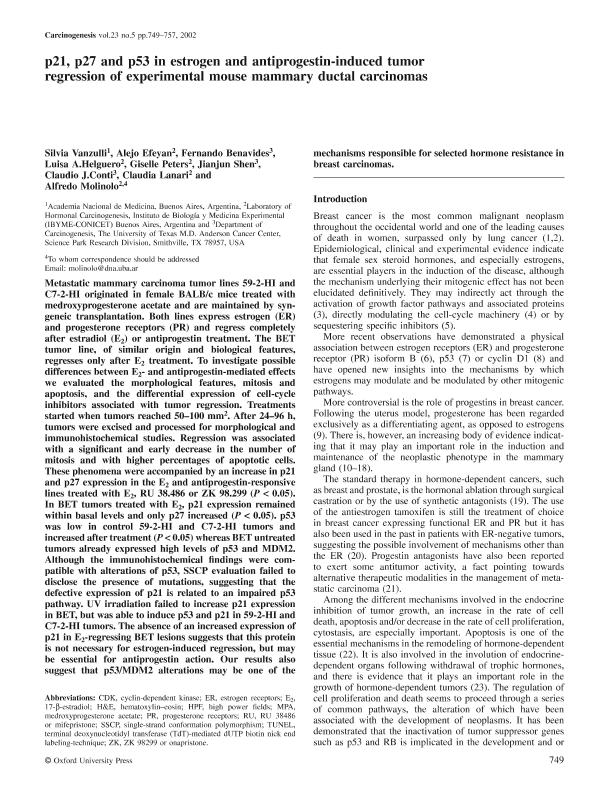Artículo
p21,p27 and p53 in estrogen and antiprogestin- induced regression of experimental mouse mammary ductal carcinomas
Vanzulli, Silvia; Efeyan, Alejo; Benavides, Fernando; Helguero, Luisa A.; Peters, Giselle; Shen, Jianjun; Conti, Claudio J.; Lanari, Claudia Lee Malvina ; Molinolo, Alfredo
; Molinolo, Alfredo
 ; Molinolo, Alfredo
; Molinolo, Alfredo
Fecha de publicación:
12/2002
Editorial:
Oxford University Press
Revista:
Carcinogenesis
ISSN:
0143-3334
e-ISSN:
1460-2180
Idioma:
Inglés
Tipo de recurso:
Artículo publicado
Clasificación temática:
Resumen
Metastatic mammary carcinoma tumor lines 59-2-HI and C7-2-HI originated in female BALB/c mice treated with medroxyprogesterone acetate and are maintained by syngeneic transplantation. Both lines express estrogen (ER) and progesterone receptors (PR) and regress completely after estradiol (E 2 ) or antiprogestin treatment. The BET tumor line, of similar origin and biological features, regresses only after E 2 treatment. To investigate possible differences between E 2 - and antiprogestin-mediated effects we evaluated the morphological features, mitosis and apoptosis, and the differential expression of cell-cycle inhibitors associated with tumor regression. Treatments started when tumors reached 50–100 mm 2 . After 24–96 h, tumors were excised and processed for morphological and immunohistochemical studies. Regression was associated with a significant and early decrease in the number of mitosis and with higher percentages of apoptotic cells. These phenomena were accompanied by an increase in p21 and p27 expression in the E 2 and antiprogestin-responsive lines treated with E 2 , RU 38.486 or ZK 98.299 ( P < 0.05). In BET tumors treated with E 2 , p21 expression remained within basal levels and only p27 increased ( P < 0.05). p53 was low in control 59-2-HI and C7-2-HI tumors and increased after treatment ( P < 0.05) whereas BET untreated tumors already expressed high levels of p53 and MDM2. Although the immunohistochemical findings were compatible with alterations of p53, SSCP evaluation failed to disclose the presence of mutations, suggesting that the defective expression of p21 is related to an impaired p53 pathway. UV irradiation failed to increase p21 expression in BET, but was able to induce p53 and p21 in 59-2-HI and C7-2-HI tumors. The absence of an increased expression of p21 in E 2 -regressing BET lesions suggests that this protein is not necessary for estrogen-induced regression, but may be essential for antiprogestin action. Our results also suggest that p53/MDM2 alterations may be one of the mechanisms responsible for selected hormone resistance in breast carcinomas.
Palabras clave:
Apoptosis
,
Mammary Neoplasm
,
Tumor Supressor
,
Proto-Oncogene Proteins P21
Archivos asociados
Licencia
Identificadores
Colecciones
Articulos(IBYME)
Articulos de INST.DE BIOLOGIA Y MEDICINA EXPERIMENTAL (I)
Articulos de INST.DE BIOLOGIA Y MEDICINA EXPERIMENTAL (I)
Citación
Molinolo, Alfredo; Lanari, Claudia Lee Malvina; Conti, Claudio J.; Shen, Jianjun; Peters, Giselle; Helguero, Luisa A.; et al.; p21,p27 and p53 in estrogen and antiprogestin- induced regression of experimental mouse mammary ductal carcinomas; Oxford University Press; Carcinogenesis; 23; 5; 12-2002; 749-757
Compartir
Altmétricas



